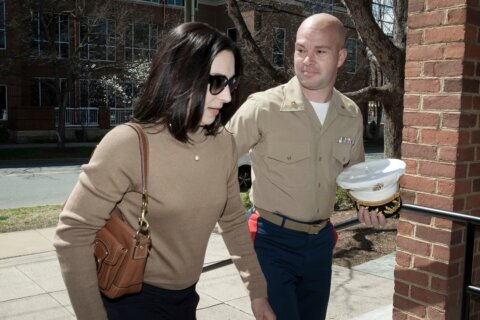WASHINGTON — Tiger moms and helicopter dads, step aside. There’s a new name for an emerging breed of over-involved parents — and they’re called snowplow parents.
Child psychologist Amy Fortney Parks describes snowplow parents as those who plow any obstacle standing in the way of their child’s success. But experts say this style of parenting causes more harm than good.
Parks says, often times, parents think they are helping their children by solving their problems.
“But what they don’t see is really in the long term, they are really not allowing their children to make mistakes.”
When you fall down repeatedly and someone is always there to help you, “you never learn to pick yourself up,” she says.
In a recent article on DailyParent.com, Lauren Nichols, an assistant professor at the Adler School of Professional Psychology, said that children need both positive and negative experiences in their lives to build self-esteem.
“By eliminating failure and even minor negative moments, parents are doing their children a disservice,” she said in the article.
Nichols says parents need to step back and let their children grow by letting them work out their own disagreements. This will give them the trouble-shooting skills they will need in their adult life.
Assign children age-appropriate household chores and let them complete their own homework to teach responsibility, Nichols says. If the grades slip, hold them accountable and brainstorm a game plan to get them back on track.
While Parks acknowledges that parents have the best intentions when pushing their children to succeed, she says, “The children that we want to be raising are the kind that can really face their own challenges and obstacles.”
Do you know a snowplow parent? Let us know in the comments section of this story, on Twitter or on the WTOP Facebook page. Until then, two local parents discuss snowplow parenting.
The following blog is in the form of letters, written by two friends and moms:
Crystal,
By now, I’m sure you have read the countless reviews and articles on author and high school teacher David McCullough’s new book, “You are Not Special, and Other Encouragements,” which criticizes what he calls “snowplow parents” for raising a generation of young adults who are “anxious, dependent, narcissistic and careerist.”
I’m sure you’ve chuckled at the title, along with every other adult over 40, and felt a jolt of recognition as he talks about the over-protective molly- coddling that has gone into raising the current generation of young adults. McCullough warns children are becoming “terrified of failure” and are being turned into “achievement machines” by their parents.
The result of all this competitive parenting, he claims, is that children can fail to settle into careers and end up dependent on drugs or alcohol, or even suffer a nervous breakdown, in a bid to live up to their over-achieving parents’ expectations.
Growing up, I always wanted to have helicopter parents — the kind of mother that got up to make you breakfast; who called you every day at college to see how you were doing; and who did your laundry when you came home on breaks without complaint. To this day, I am envious of a friend whose father would drop her off at the door of a theater or restaurant before looking for parking, just so his precious daughter wouldn’t get wet in the rain.
My parents were routinely late for every school pick-up and ballet recital, and were content to let me walk home alone from school down an isolated country lane in the cold, rain and dark.
Now that I’m a mother and soon-to-be empty nester myself, I’m sure you are expecting to say my views have changed. But as a matter of fact, they haven’t. Sure, I’ve read the recent stories about helicopter, and now snowplow, parents with interest, and while I’m not Type A enough to be either (it requires an amazing amount of strategic planning, not to mention effort, to raise a child this way), I do personally believe that one of the most important and rewarding aspects of parenting is to help make your children’s lives easier. I want my children to feel loved, protected and cared for, and to provide them wherever possible with the kind of educational and enrichment opportunities that will enable them hopefully one day to embark upon a rewarding career, and provide a similar kind of nurturing to their own children, and others, once they are grown.
Living in the suburbs of Washington D.C., it’s easy to come across examples of parents who go too far when it comes to nurturing — some would say controlling — their children. There’s the woman whose 11-year-old daughter came over for a playdate, and asked me what she should do with the soiled tissue in her hand after she sneezed. And I know of numerous examples of wealthy parents who have carefully and systematically tried to build their teenagers’ college resumes by sending them to Beijing to learn Mandarin; to Oxford to take advanced math; and to summer internships in New York, where the teenager in question can try their hand at documentary filmmaking without having to worry about how they are going to pay for rent and food.
I can’t help thinking that all these activities do little more than demonstrate that the parents of the teenager in question are wealthy and well- connected. Or maybe I’m just jealous.
At the same time, however, I’m impatient with McCullough’s criticism of snowplow parents for doing whatever it takes to help their kids get ahead in life. As McCullough says himself, “If you do not get into one of the top 30 to 50 colleges, you are in for a very hard time in life — that’s the thinking driving all this.”
In an increasingly interconnected, globalized world, where corporations and jobs move at lightning speed to wherever taxes and wages are lowest, our children will need to grow up to be exceptional just to find employment. So when McCullough exhorts us, as parents of soon-to-be young adults, to “try as much as possible to give children free rein,” and “let them follow their own passions and curiosities without overweening interference every step of the way,” I feel like asking whether McCullough is aware of his own inconsistency in advocating a laissez-faire approach to parenting, while at the same time acknowledging that kids who don’t make it into the top 2 percent of colleges are in for a very hard time in life.
And when he argues that “Sometimes our kids take paths they shouldn’t; sometimes they will make mistakes. That’s OK,” I feel like responding, “No, David; No it’s not.”
– Phoebe
***
Phoebe,
As I helped install my second darling child into her dorm room last week, I listened carefully to the dialogue between her roommate and mother. The mother was being chastised for forgetting a number of items and was eating humble pie in spite of her best efforts. The mother is a cheerful and competent woman who proudly displayed accessories her daughter could share (or not) with her roommates. It was quickly apparent she wanted our approval for her kindness and competence. I thanked her generously and genuinely, but realized so much of what she did was about her and not her daughter.
My theory about snowplow parents is, really, illustrated by my recent experience. Their cushioning of every blow and handling of every crisis occurs because they are perfectionists who fear failure themselves, and have an unquenchable need to have their children succeed as they have. They are often the parents who, as workers, lead a team of people and complete all their subordinates’ projects as well as their own. As most of us know, this makes employees (and children) disgruntled and discontent in the long run. The clear message is that only they know how to do it right. Not a great message to send anyone, really, although it is remarkably tempting to always get your own way.
When my own darling remarked on her own forgotten items, I told her to add them to her list for the relatively nearby Target and we would make one trip before I left later that day. She grumbled a little but understood it was her responsibility, not mine, to pack her belongings for college.
I’d like to tell you I carefully cultivated the persona of hands-off mothering, but the truth is, four children make that much easier. Besides often feeling overwhelmed by so many little people with so very many needs, I’m also an only child myself. In combination this means I had no idea what I was getting into and also highly value “me” time. The result, I think, are kids who (at least in theory) know how to make a list and execute on it. They aren’t perfect, trust me, and neither am I. I sometimes rush to the rescue when a forgotten textbook would mean a failing test grade and they sometimes roar at me when their own negligence results in not succeeding. But, twice so far at least, they know it’s their job to pack for college. Can’t be entirely sure that translates to taking more responsibility in their own lives each year, but I’m hopeful. I have to be.
Remember, dear Phoebe, your friend’s father will inevitably not always be there to keep her from getting her feet wet. Although a charming tradition to be sure, I hope she knows how to cope when it inevitably happens. It is, metaphorically, at least, one of the most important life lessons for all of us.
– Crystal
Editor’s Note: Both bloggers are two local moms who live in the D.C. area; they write about their adventures on their blog Desperate in D.C. Phoebe Thompson hails from Mother England, but has happily embraced the U.S. and D.C. in particular. She is mother to two girls, wife to darling husband, Brad and best friend to Crystal.
Crystal Walker is a D.C.-based lawyer, wife and mother of four, who arrived from the glorious Midwest. When she’s not busy juggling her work and children, she enjoys blogging about her family’s adventures in the Nation’s Capital. Of course her favorite pastime is gleefully skewering the privileged and powerful D.C. elites with her BFF, Phoebe Thompson.
Follow @WTOP and @WTOPliving on Twitter and on the WTOP Facebook page.






